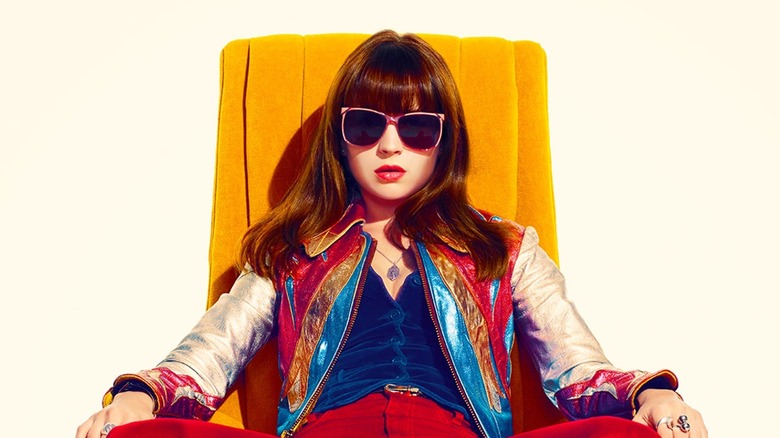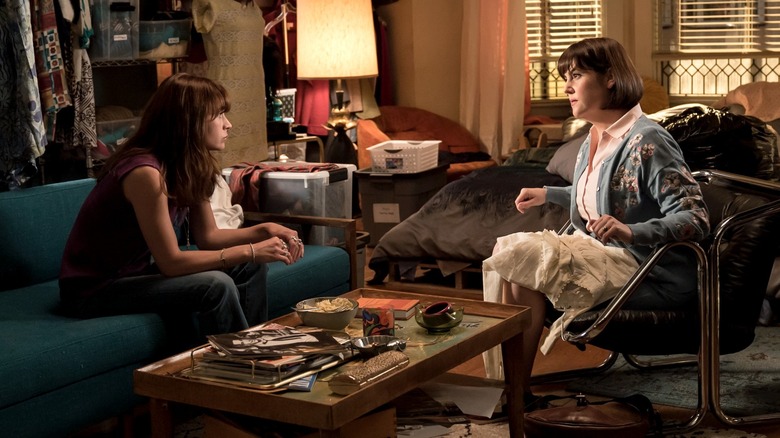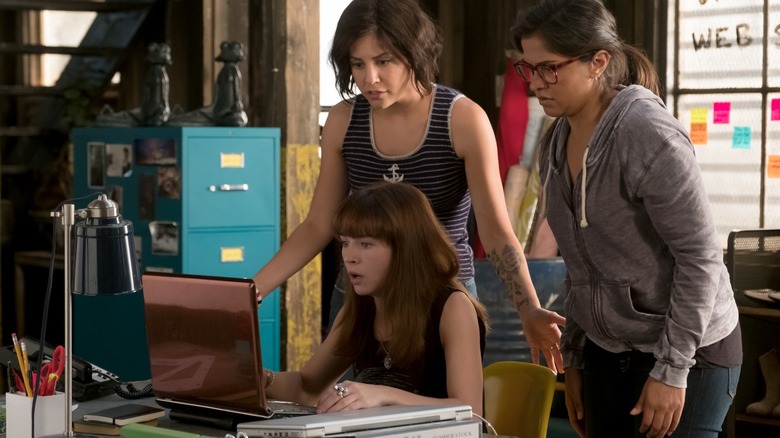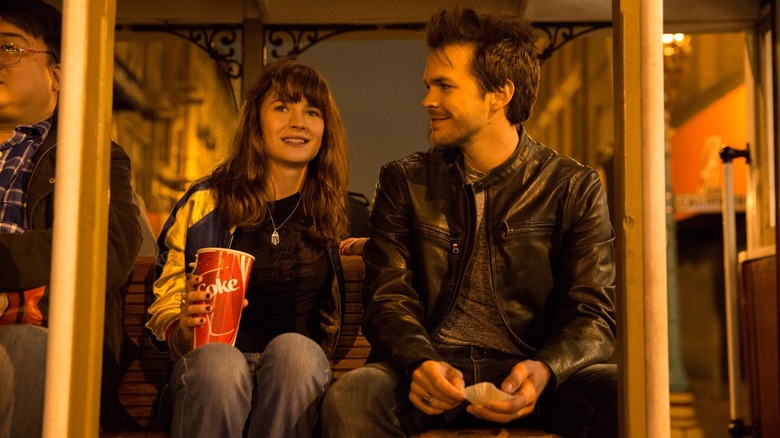TV, Interrupted: Girlboss Is Netflix's Greatest Guilty Pleasure
(Welcome to TV, Interrupted, a series where the /Film team remembers, eulogizes, and makes a case for the revival of TV shows we loved that were canceled far too soon.)
While musing over the name for her new business selling cheap thrift store clothing for a mark-up on eBay, "Girlboss" protagonist Sophia (Britt Robertson) brainstorms the perfect combination of words that will summarize her personality, her brand, her image, and comes up with "White ... b****."
That's not the name she ends up going with, but it's not far off. Created by Kay Cannon ("Pitch Perfect"), the show is loosely ("real loose," as the opening of each episode warns) based on the true story of Nasty Gal founder Sophia Amoruso and her memoir "#Girlboss." Diagnosed with depression and ADHD in her teens, Amoruso dropped out of school and bounced from minimum wage job to minimum wage job before starting her eBay business at the tender age of 22. Several studies have shown a link between ADHD and entrepreneurship, perhaps as a reflexive escape from the unbearable monotony of the 9-to-5 job, and the Sophia in "Girlboss" certainly captures that spirit of stumbling upon success as a side effect of thrashing back against the stifling boredom of adult life.
"Girlboss" season 1 covers Sophia's journey from reselling a single awesome jacket for a massive profit to finally launching the Nasty Gal website, independent from its former eBay trappings. And one season was all we ever got, because Netflix quickly canceled the series. "Girlboss" joined the heaving mass of short-lived Netflix shows that have since been drowned under the weekly waves of new Content. But grab a snorkel and dive in, because "Girlboss" is gold standard guilty pleasure viewing.
Why Girlboss was great
Has the initial hate subsided enough for me to make the case that "Girlboss" is sorely underrated? I suppose we'll find out. But certainly this is one Netflix show that I've found myself returning to over and over again.
"Girlboss" is perfect comfort TV. It's funny in that "Gilmore Girls," mile-a-minute quips, larger-than-life characters sort of way. It's major nostalgia-bait for those who entered the adult world in the mid-2000s. The cinematography is bright and colorful. It has dress-up montages and a bland-but-hot love interest. It has a great best-friend dynamic between Robertson and Ellie Reed, who plays Sophia's longtime BFF Annie — and yes, we get an episode where you find out how they first met, á la the "Broad City" episode "Sliding Doors."
The stellar cast doesn't end there. Also among the supporting players are Jim Rash ("Community"), Dean Norris ("Breaking Bad") and RuPaul (of "RuPaul's Drag Race") fame. But the real highlight is an endlessly entertaining guest performance from "Yellowjackets" star Melanie Lynskey, who plays a neurotic, introverted vintage clothes connoisseur who ruthlessly goes to war against Sophia's careless attitude of cutting up and restyling clothes instead of carefully preserving them in a box with acid-free tissue paper.
Why Girlboss was canceled
Well, it got mostly bad reviews and was the internet's favorite punching bag for about a week. Really, it would have been a far greater surprise if "Girlboss" hadn't been confined to a single season. But let's dive a little deeper into why the show was so poorly reviewed, and why it made such a good punching bag.
"Girlboss" came out in 2017, when the word "girlboss" itself was already starting to fall out of favor and towards the plateau of purely ironic use. But the word "problematic" was still very much in vogue, and "Girlboss" had plenty of hooks upon which to hang the "problematic" label (not the least of which is RuPaul's character, who embodies a sassy-gay-Black-friend-who-only-exists-to-be-a-sounding-board-for-the-protagonist trope that should have been retired about a decade ago).
Then there's the girlboss herself. Sophia is selfish, bad-tempered, irresponsible, loud, abrasive, and childish — labels that she wears proudly, for the most part. Now, at the time it wasn't necessarily verboten for female protagonists to be flawed to the point of monstrous or to make consistently terrible decisions; just look at the success of "Crazy Ex-Girlfriend," which debuted a couple of years earlier. But whereas Rebecca's exploits in "Crazy Ex-Girlfriend" typically resulted in pratfalls and humiliations, Sophia's were coupled with a rags-to-riches success story, and the use of "girlboss" in the title was mostly sincere, not ironic.
Then of course there's the problem of the real-life rags-to-riches success story that the show was based on — which, by 2017, was a rags-to-riches-to-bankruptcy story. Sophia Amoruso stepped down as CEO of Nasty Gal in 2015, and the company filed for chapter 11 bankruptcy the following year. Employee reviews described the company as suffering from "pervasive low morale" and described Amoruso herself as "wildly disconnected from the reality of business."
Amoruso herself seems to agree with that assessment; speaking to Forbes after her departure from Nasty Gal, the advice she offered to wannabe entrepreneurs was to "get some real management chops [and] know more than I did before you try to do what I've done." The show itself is thoroughly unflattering and makes little effort to sand off Amoruso's rough edges (one episode centers around Sophia being outraged that Annie would dare to request a full-time paid job at Nasty Gal after putting in countless hours of unpaid labor). But Sophia is still the protagonist, and we're still ultimately supposed to root for her and for the successful launch of Nasty Gal. And that was, well ... problematic.
Unfinished business
Perhaps the saddest thing about the cancelation of "Girlboss" is the fact that we never got to see Sophia truly fail, and she only really grows as a person in small increments. In the show's first and only season, she's a selfish, self-centered, self-declared "b****" who's constantly screwing things up. You frequently find yourself cringing as she stumbles into yet another easily-avoided mishap. But then again, if any one of us was to watch a TV show based on ourselves in our early 20s, we'd probably end up cringing three times as much. Let she who did not spend her early 20s making bad decisions and wallowing in navel-gazing cast the first stone.
If "Girlboss" has a counterpart here in the U.K., it would have to be the comedy series "Fresh Meat." That show follows a group of housemates through three years at university, from the start of their degrees to the end (approximately from the ages of 18 to 22). And like Sophia, they are for the most part a truly terrible and embarrassing collection of human beings, making disastrous choices while voicing ignorant and high-minded opinions with a confidence that not one of them has earned.
But that's kind of what happens in your late teens and early 20s. There's a popular narrative that life is a steady decline from the promise and potential of youth to the disappointment and unfulfilled dreams of later adult life ... but ideally, you should be the worst possible version of your adult self at 18. Just as children go from the "terrible twos" of toddlerhood to (hopefully) learning empathy and self-control as they get older, so too can they continue to learn and improve after flying the nest and embarking on an independent life as young adults. And the road to self-improvement is paved with catastrophic mistakes.
The season 1 finale of "Girlboss" feels like a distinctly unearned and unsatisfying happy ending for Sophia. It's like if "The Wolf of Wall Street" ended at the high point of Jordan Belfort's career, before the FBI caught up to him, or if "Catch Me If You Can" had ended before Frank Abagnale was actually caught. That's because "Girlboss" isn't really a rags-to-riches success story; it's an Icarus story about a meteoric rise followed by a downfall. We just never got to see the downfall.
Will Girlboss ever return?
Oh no, no way. And honestly, that might be for the best. The discourse was tiring enough the first time around; who wants to sit through another round of finger-wagging hot takes about how "Girlboss" is a Bad Feminist Show That's Bad at Feminism? But for what it's worth, here's what season 2 would have been about, according to showrunner Kay Cannon:
"We would see more of her rise. It's unclear if she'd move to L.A. or not, but we'd see some of the bumps of actually being a boss to people. What we'll do in the show is this idea of understanding what your strengths and weaknesses are. A big weakness of Sophia's is that she has no business managing people, especially when they're her friends, and how these friends could possibly take advantage of having their very young boss be their friend at the same time. We'll explore all of that."
So keep that in mind and take the season 1 finale as it was intended: a high point that preceded a whole bunch of other peaks and valleys that we'll never get to see. "Girlboss" was here for a good time, not for a long time.




